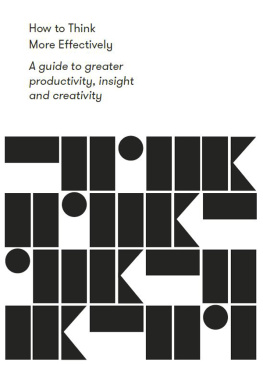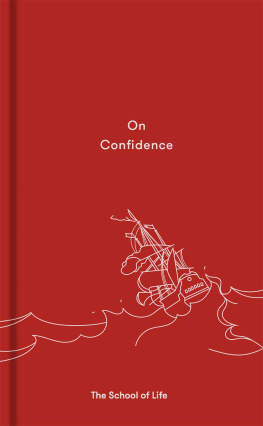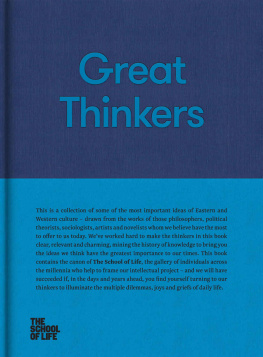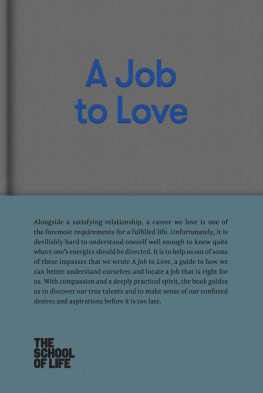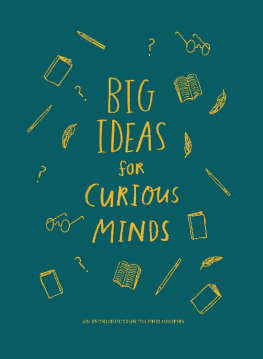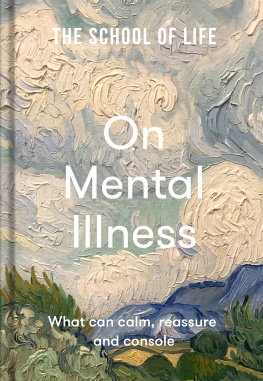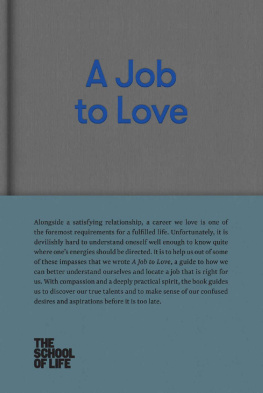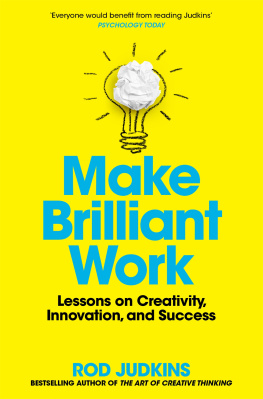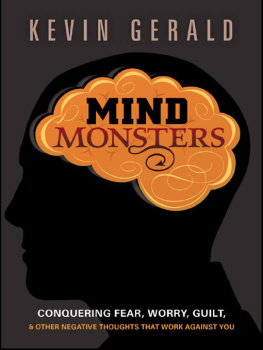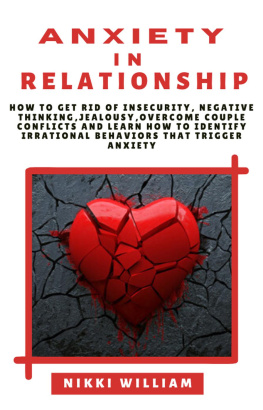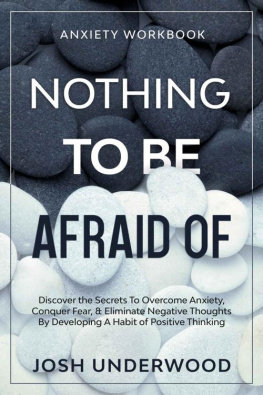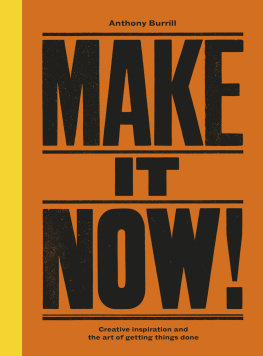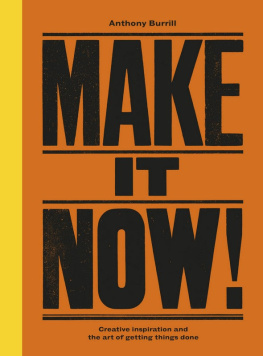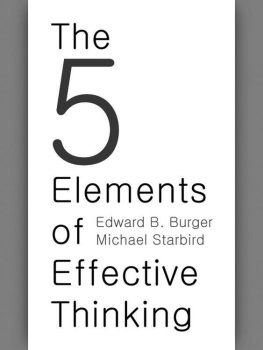Contents
Guide
How to
Think More
Effectively
How to
Think More
Effectively
Published in 2020 by The School of Life
70 Marchmont Street, London WC1N 1AB
Copyright The School of Life 2020
Designed and typeset by Marcia Mihotich
Printed in Belgium by Graphius
All rights reserved. This book is sold subject to the condition that it shall not be resold, lent, hired out or otherwise circulated without express prior consent of the publisher.
A proportion of this book has appeared online at www.theschooloflife.com/thebookoflife
Every effort has been made to contact the copyright holders of the material reproduced in this book. If any have been inadvertently overlooked, the publisher will be pleased to make restitution at the earliest opportunity.
The School of Life is a resource for helping us understand ourselves, for improving our relationships, our careers and our social lives as well as for helping us find calm and get more out of our leisure hours. We do this through creating films, workshops, books and gifts.
www.theschooloflife.com
ISBN 978-1-912891-41-2
10 9 8 7 6 5 4 3 2 1
Introduction
One of the odder aspects of our minds is how variable they are in the quality of their output. At certain moments, we are capable of great insight and creativity; at others, everything that emerges from us feels leaden, earthbound and clichd. Although the good progress of our lives depends on our minds functioning at their peak, we dont generally suppose that there is much we could do to control or influence the quality of our thoughts. In fallow periods, we tend to hope that letting time pass will improve matters. We see good thinking in mystical terms: as a gift from outside forces that we cannot steer or regulate.
However, we need not be so pessimistic: we can learn to improve our chances of having good thoughts by paying closer attention to the operation of our minds and by practising mental manoeuvres designed to tease the best out of them. We can more systematically observe what happens when we are on a rewarding track and learn to jog ourselves onto one through deft exercises of the will and the imagination.
We should not be surprised that we are so unpractised in this area. Our societies pay enormous attention to the results of good thinking but very little to their genesis. Our education systems operate with a narrow sense of what fruitful thinking involves; the focus is on facts and formulae, on the capacity to reel off quotes and summarise opposing views.
We are taught to obsess about passing exams: that is, trials marked by people who feel confident that they already know the existing truths and are merely checking whether we have learnt to submit to them too. School thinking marks us for life and lends us an ongoing bias towards neglecting our individual perceptions in favour of meeting pre-existing expectations. But genuine adult achievement relies on a capacity for originality and authenticity of thought. Effective thinking isnt about working hard in any brute or rote sense; it is about learning to spot, defend, nurture and grow our fleeting, tentative periods of insight.
What follows are a set of moves that hope to release the better parts of our minds and to help us identify and hold on to our prime mental moments. The suggestion on offer is that we can learn systematically to harvest rather than sporadically to forage our most satisfying and necessary thoughts.
There is a fundamental distinction to be made between two kinds of thinking: figuring out what we would like to achieve, and working out how to achieve it. Put another way, there is a key difference between strategy on the one hand and execution on the other. Strategy is about determining our overall aims; execution comprises everything that follows once weve decided the practical activities required to put our plans into action.
It is natural to assume that we would spend a lot of time on strategy before we turned our attention to execution however successful we might be in carrying out our plans, what really counts is having the right plans to work from in the first place. Our results can only be as good as the aims that first led to them.
But there is a paradoxical aspect to the way our minds operate: as a general rule, were much better at execution than at strategy. We appear to have an innate energy for working through obstacles to our goals and an equally innate resistance to pausing to understand what these goals should rightly be. We seem to be as lackadaisical about strategy as we are assiduous about execution.
We see the outcome of this bias across many areas. We concentrate more on making money than on figuring out how to spend it optimally. We put a lot more effort into becoming successful than into assessing how dominant notions of success could make us content. At a collective level, corporations are much more committed to the efficient delivery of their existing products and services than on stepping back and asking afresh what the company might truly be trying to do for their customers. Nations are more concerned with growing their GDP than with probing at the benefits of increased purchasing power. Humanity is vastly better at engineering than philosophy: our planes are a good deal more impressive than our notions of what we should travel for; our abilities to communicate definitively outstrip our ideas of how to understand one another.
In every case, we prefer to zero in on the mechanics, on the means and the tools rather than on the guiding question of ends. We are almost allergic to the large first-order enquiries: what are we ultimately trying to do here? What would best serve our happiness? Why should we bother? How is this aligned with real value?
There are tragic consequences to this over-devotion to execution. We rush frantically to fulfil hastily chosen ends; we exhaust ourselves blindly in the name of sketchy goals; we chain ourselves to schedules, timelines and performance targets. All the while, we avoid asking what we might really need in order to flourish and so frequently learn, at the end of a lifetime of superhuman effort, that we had the wrong destinations from the start.
Perhaps it should not surprise us that our minds have such a pronounced bias towards executive labour over strategic reflection. From an evolutionary perspective, mulling over strategic questions was never a high priority. For most of history, the strategic goals would have been obvious: to find sufficient things to eat, to reproduce, to get through the winter and to keep the tribe safe from attack. Execution was where all the urgent and genuine difficulties lay: how to light a fire in wet weather; how to make sharper arrowheads; where to find wild strawberries or the right leaves to calm down an inflammation. We are the descendants of generations that made a succession of complex discoveries in the service of a few basic goals. Only in the conditions of modernity where we are surrounded by acute choices as to what to do with our lives and when our aim is happiness rather than basic survival have strategic questions become at once necessary and costly to avoid.
Little about our formal education has prepared us for this development. At school, working hard still means dutifully following the curriculum, not wondering whether it happens to be correct. Why should we study this subject? sounds, to most teachers, like an insult and a provocation, rather than the birth of an admirably speculative mindset. Once we start employment, most companies want the bulk of their employees to execute orders rather than reflect on their validity. We might be reaching middle age before we are granted the first formal incentives to think strategically.

